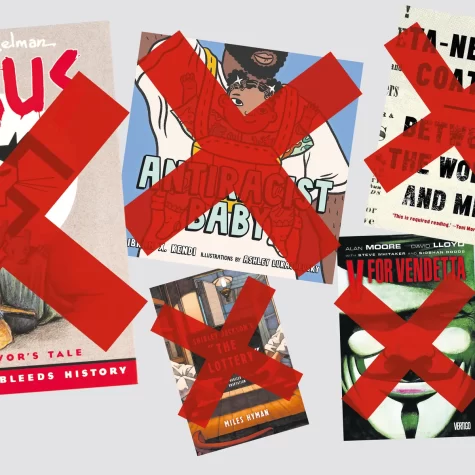What parts of the English curriculum are parents trying to remove?
Concerns about several texts added to the English curriculum are being voiced by parents.
Throughout the academic year, students are usually assigned a selection of books to read, such as The Book Thief, To Kill A Mockingbird, or even collections of poems. Pupils can ponder as to who selected these particular books and why it’s crucial for them to read as they painfully read page after page to get ready for an exam they have the following day.
Parents at Granite Bay High School in California have recently started to voice their disapproval of some of the textbooks assigned to their children’s classes. Many parents have continued to point out the warning signs they noticed even though the California Board of Education has cleared every book moving through the systems. Race and sexual orientation, religion, and the government were among the many frequent worries. About 40 novels have been marked by parents so far, 29.4% of which deal with racial discrimination.

While bringing up race could make a student feel uncomfortable or even guilty I feel that it’s an important topic to learn especially because it plays a huge role in our history. By ignoring these stories, we are erasing an important aspect of American history and culture that can help children understand race, the power of inclusivity, and how we interact in a multicultural society. It is evident that these problems have not been resolved in our culture if it is uncomfortable to even talk about racism. 66.7% of the books in question were written by African Americans. Race-related books shouldn’t be banned. As a result of reading these stories, students are compelled to admit that their perspective is not the norm as a result.
21.6% of all questioned materials in the document that the parents brought forth touched on homosexuality. LGBTQ+ perspectives are underrepresented in our educational system, and it is transphobic and homophobic to remove content for having a queer or trans character alone.
Schools should be broadening kids’ worldviews, not removing books or poems from the curriculum because people disagree with the content for religious or political reasons. Public school education must include exposure to material and ideas we find objectionable. Our pupils won’t be able to understand all sides of an issue if we only approve of the curriculum when our views are included.
By restricting critical thinking and challenging topics from our curriculum, we take away a crucial facet of education. Canyon cannot claim to encourage students’ intellectual curiosity and critical thinking if it is reluctant to expose them to material that contradicts the traditional narrative. Through high school, the fixation with isolating kids with different viewpoints results in less tolerant members of society. In the name of the students, beneficial content is being erased. However, these adjustments won’t make students’ lives any better. A school that turns forth students who lack knowledge, have only one point of view, and are complacent is ineffective.
These decisions will be decided for us if we don’t voice our opinions and participate in the process.
